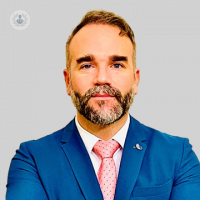Sleeve gastrectomy: Key considerations and expected outcomes
Escrito por:A sleeve gastrectomy is a widely-recognised weight loss surgery designed to help people with obesity achieve significant and sustained weight loss.
Mr Ioannis Gerogiannis, renowned consultant general, gastrointestinal, and bariatric surgeon, provides an in-depth understanding of a sleeve gastrectomy, addressing key questions and concerns.

Who is a candidate for a sleeve gastrectomy?
A sleeve gastrectomy is generally recommended for people struggling with obesity. People who may benefit from this procedure include:
- People with a BMI of 40 or higher: People with a BMI (body mass index) of 40 or higher are generally eligible for a sleeve gastrectomy. This high level of obesity poses significant health risks.
- People with a BMI of 35-39.9 with obesity-related health conditions: People with a BMI between 35 and 39.9 may also qualify for a sleeve gastrectomy if they have developed obesity-related health conditions, including type 2 diabetes, hypertension, or sleep apnoea.
- Previous weight loss efforts: People who have made previous attempts at weight loss through non-surgical methods, such as diet, physical activity, or medical treatment, may be eligible for a sleeve gastrectomy.
How is a sleeve gastrectomy performed?
A sleeve gastrectomy is typically performed laparoscopically, which involves making several small incisions in the abdomen. A laparoscope (a thin tube with a camera) and other specialised instruments are then inserted through these incisions to help the surgeon perform the operation.
Approximately 75-80% of the stomach is removed during a sleeve gastrectomy, which limits the amount of food it can hold. The surgery also removes the part of the stomach that contains cells that produce ghrelin, a hormone that stimulates appetite. With a smaller stomach, and lower levels of ghrelin, you will feel full more quickly after eating smaller amounts of food, helping to avoid overeating.
The remaining portion of the stomach is lastly shaped into a thin, tube-like structure, resembling a “sleeve”.
What is the typical recovery time after a sleeve gastrectomy?
After the procedure, you will typically remain in hospital for 1-2 days for monitoring and recovery. The first week of your recovery will involve managing pain and gradually increasing activity levels, and you will be encouraged to walk soon after the surgery to increase blood circulation and reduce the risk of blood clots.
Initially, you will start on a liquid diet, gradually progressing to pureed foods, and then to solid foods over several weeks. Most people will return to normal activities, including work, within 2-4 weeks depending on their job and their personal recovery progress.
What type of results can I expect with a sleeve gastrectomy?
One of the primary benefits of a sleeve gastrectomy is the substantial weight loss that people can achieve. The procedure generally leads to a loss of 60-70% of excess body weight within the first two years post-surgery. The most rapid weight loss will generally occur in the first six months, with continued gradual loss over the next 18 months.
In addition to weight loss, many people will experience improvements in obesity-related health conditions, including better blood sugar control, reduced blood pressure, and alleviation or resolution of sleep apnoea symptoms.
What lifestyle changes may be necessary after surgery for maintaining the weight loss?
Maintaining weight loss and health improvements requires a long-term commitment to lifestyle changes, but with proper care, a sleeve gastrectomy can provide lasting benefits.
Post-surgery, dietary adjustments are crucial, including eating a diet rich in lean proteins, vegetables, fruits, and whole grains while avoiding high-calorie, high-fat, and sugary foods. Due to the reduced stomach size, it will be necessary to eat smaller, more frequent meals and to drink plenty of water throughout the day, though it’s important to refrain from drinking during meals to prevent overfilling the stomach.
Similarly, regular physical activity will be crucial for maintaining weight loss and your overall health. This should include aerobic exercises such as walking, swimming, or cycling; strength training to build muscle and boost metabolism; and flexibility exercises like yoga to enhance mobility.
Behavioural changes are important as well, including practising mindful eating techniques to recognise hunger and fullness cues and avoid emotional eating. Lastly, regular follow-ups with your surgeon are crucial for monitoring progress, managing complications, and adjusting your treatment plan as needed.
If you would like to schedule an appointment with Mr Ioannis Gerogiannis, head on over to his Top Doctors profile today.


